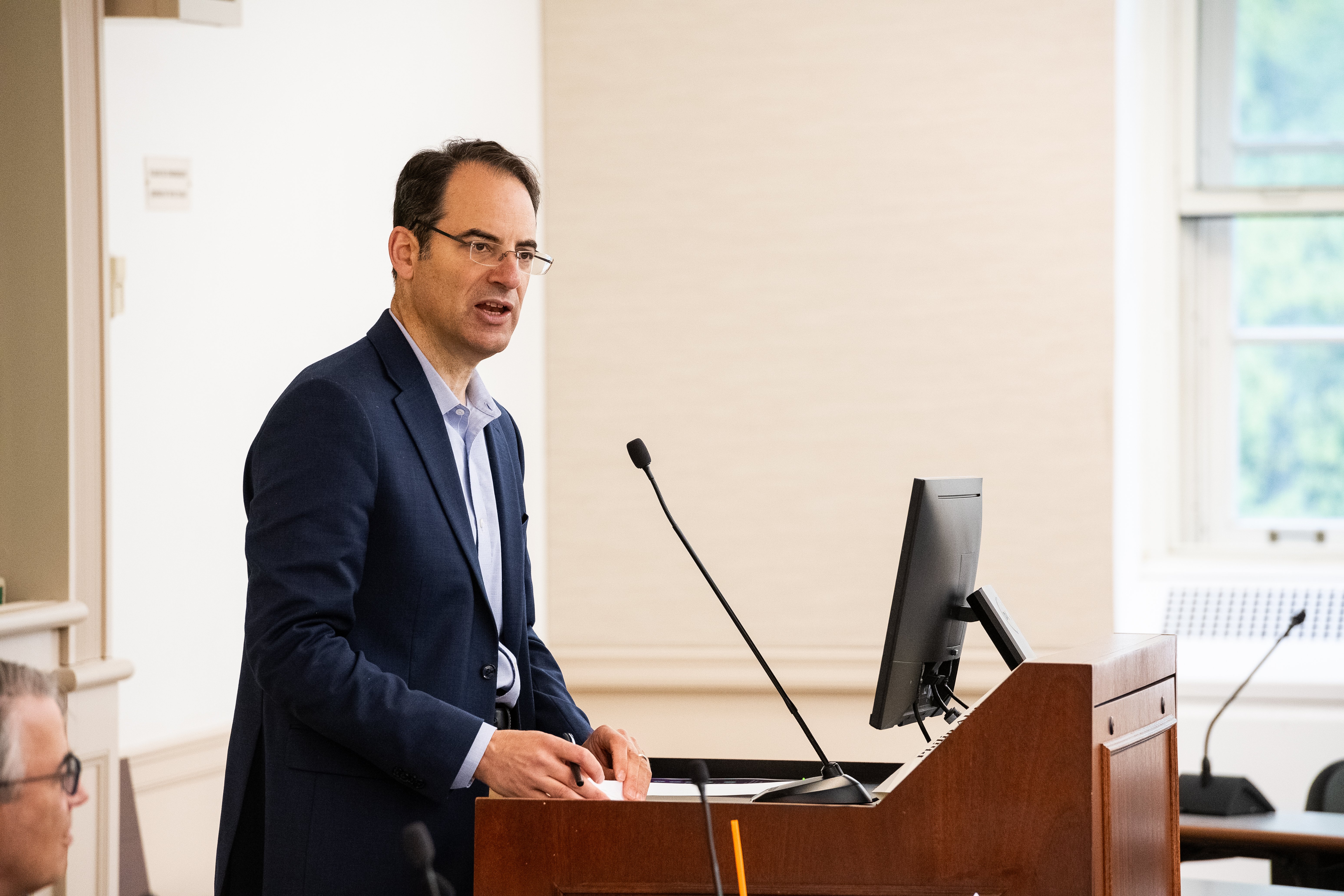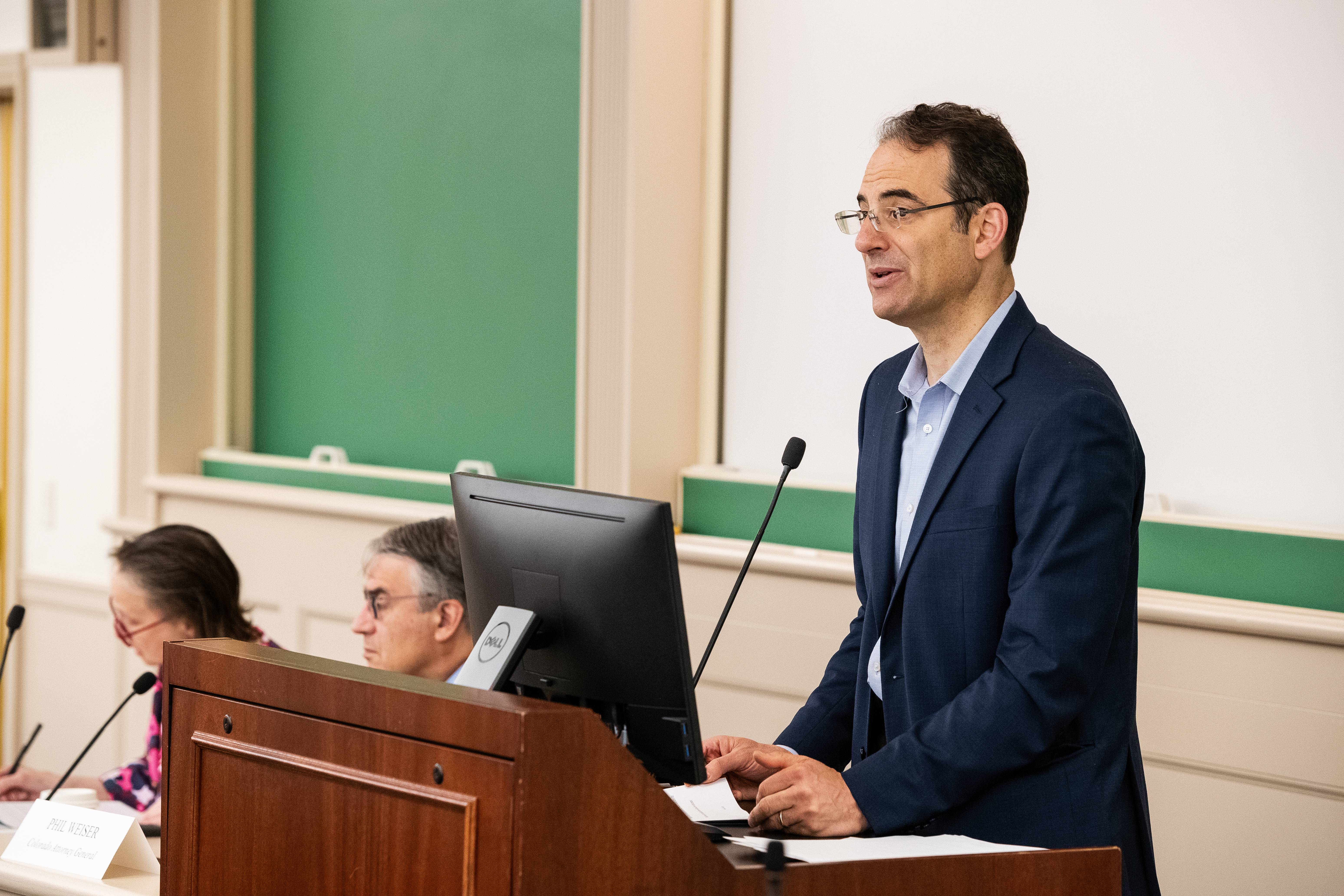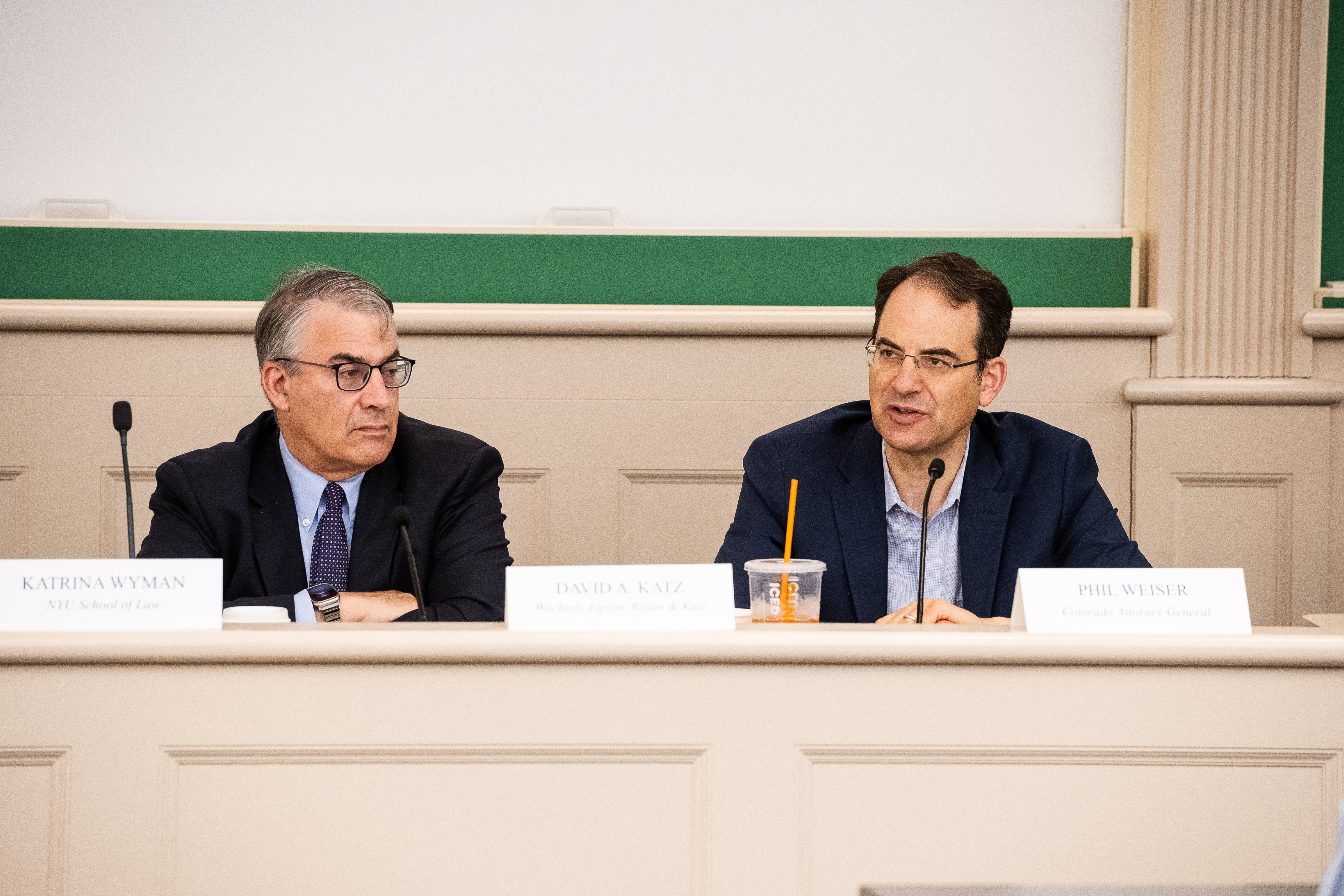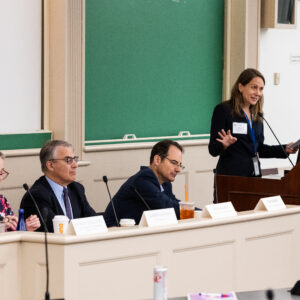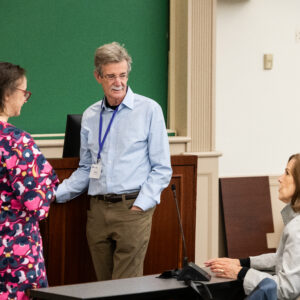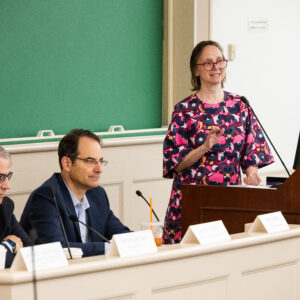ESG and Antitrust: An AG’s Perspective
- Saturday, April 20, 2024
- 9:30am–10:30am
- 40 Washington Square S, New York, NY
At this event, Colorado AG Phil Weiser spoke about antitrust law and corporate commitments in the environmental, social, and corporate governance (ESG) space. This event was part of NYU Law’s Reunion and was cosponsored by the State Energy & Environmental Impact Center and the Institute for Corporate Governance & Finance.
From the Event
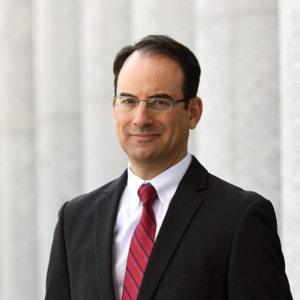
Read a Copy of AG Weiser’s Remarks
The Rule of Law and Antitrust, at New York University Law School (April 20, 2024)
“The rule of law is a term we are hearing more and more these days. I recognize that there are lots of definitions for this term; let me offer this one—law enforcement actions should not differ based on who is the target and legal standards should not be bent to serve political agendas.”

Empowering Consumers, Encouraging Competition, Yet…Eliciting Claims of Antitrust Violations?
ESG has been all over the news lately as companies consider how to empower consumers to make informed choices. Recently, Colorado Attorney General Phil Weiser spoke out against efforts to put a stop to these “pro-competitive, pro-consumer” practices.
Key Takeaways from AG Weiser
“For state attorneys general, there is a temptation, and a risk, that we will make selective enforcement threats against American businesses that are consistent with, or even driven by, political priorities. . . To defend the rule of law, we must evaluate rigorously—in the First Amendment arena, the antitrust arena, and other domains—whether a particular action would be taken if the subject of the action were different.”
“If businesses are working together to protect valuable goals like protecting consumer privacy or responsible AI, or safeguarding natural resources, or addressing our changing climate, that advances the public welfare and does not offend antitrust laws.”
“If companies want to say that they’re green and they specify 100% recycled materials, they need to actually do what they say they’re going to do. This is pro-competitive and pro-consumer. . . . Providing clear information to consumers is good for consumers. And when companies are looking for ways they can disclose how they address climate issues, that’s helping consumers make informed choices. . . . On ESG, what I would love to see is if there are people who are pretending to be environmentally friendly and aren’t, I think there’s still room you could have a bipartisan case.”
“To attack a program of this kind is to undermine a key part of what our free market system can be, which is companies can make commitments, consumers can make decisions, and consumers benefit from having this additional information.”
““If you give in to intimidation that’s not based on a true legal analysis, then you’re inviting more of this activity. . . . Businesses have [had] three choices: stand the ground; do the same thing-ish and change the name; or walk it back. And those are the decisions companies are facing. And what I want to provide, both for DE&I and for ESG, is I’ll call it air cover and say you’re on safe, legal ground, and there are smart business decisions for you to act in ways that are responsible and that consumers are looking for.” . . . Providing investors with clear disclosures around either the risks that climate poses their business or how they’re approaching climate is good for investors to make decisions and to enable ESG investing. So what’s at stake is undermining choices that can be made in the marketplace, whether there’s a marketplace of ideas, investor marketplace, or consumer marketplace.”
“The more we undermine particularly national regulation and effective self regulation, the more Europe is going to occupy the field.”
“You could talk about responsible AI, you can talk about antitrust, you can talk about other areas....One of the concerns I have is without an ability to support effective national governance and maybe accompanying self regulation, think about privacy as another example, we’re going to cede to Europe, which I agree generally is going to do more onerous and potentially less rigorous, regulatory policy. And historically, on many of these—securities is a good example—the US has led. And that leadership right now is really at risk.”
Full Transcript
[0:00 - Rachel Ramirez Guest] Good morning. All right. Okay. Thank you all for joining us. And thank you Professor Wyman for sorting out the technology. We will begin momentarily. And I just want to make sure that everyone is aware that this event is going to be recorded. Thank you.
[0:40 - Bethany Davis Noll] Good morning everybody. I hope you had a chance to get some coffee and some refreshments. I’m Bethany Davis Noll. Welcome! Welcome this morning, and glad to have you here. I’m the Executive Director of the State Energy and Environmental Impact Center here at NYU Law School. At the Center, we focus on supporting AGs in their clean energy and environmental protection work. And I also teach a class at the law school about government lawyering at the state level. And you may or may not know this, but in this time of deep partisan polarization in this country, at the national level, states are where it’s at. That’s why I’m so excited that AG Weiser is here and doing the amazing work he is doing at the state level. We see AGs filling in the gaps on all sorts of issues and standing up for the people of their states. And that’s what the Center is about and that’s what my class is about. And if you’re a student out there, I encourage you to look into what we do. We’re co-sponsoring this event with the Institute for Corporate Governance and Finance, which is co-directed by Professors Ed Rock, Rob Jackson, Emiliano Catan. Thank you so much to their executive director, Nadia Jannetta, for her help in pulling this all together, and to the Institute for being a thought partner on many issues where we have overlapping interests, including this one.
[1:57 - Bethany Davis Noll] We’re joined today by David A. Katz and Katrina Wyman. David will introduce AG Weiser and Katrina will moderate the Q&A with AG Weiser. David is also an alum of the law school and a corporate partner at Wachtell, Lipton, Rosen & Katz. He’s a trustee at the University, Law School, and Langone Health System, and the chair of the board for the Institute. We’re here to talk about corporations and their environmental, social, and governance commitments, and David has deep expertise on questions of corporate governance, and we’re grateful he can join us to introduce this topic. Professor Katrina Wyman, the chair of the State Impact Center’s Advisory Council, is obviously a beloved professor here at the law school, where she teaches a bunch of environmental courses and also runs the Guarini Center on Environmental, Energy and Land Use Law, and wears many other hats, including knowing how to run the technology in a room like this. Totally great. Thank you both so much for being here. And I will say one administrative note. We’ll be passing out note cards so you can put your questions there, and then I’ll pass them to Katrina. I’ll do that in a second. Okay. David, I’m turning it over to you. Thank you.
[3:13 - David A. Katz] Thank you Bethany. I’m privileged to introduce our keynote speaker today, Attorney General Phil Wesier. He’s Colorado’s AG, and here celebrating his 30th law school reunion. Attorney General Phil—[applause] Attorney General Phil Weiser is serving his second term as the 39th attorney general of the state of Colorado. Since becoming the state’s chief legal officer in 2019, Attorney General Weiser has demonstrated an unwavering commitment to serving the people of Colorado, advancing the rule of law, protecting our democracy, and promoting justice for all. Through engagement and collaborative problem-solving, the Colorado Department of Law has achieved a number of significant milestones under Weiser’s leadership. Before his time as attorney general, Weiser was the dean of the University of Colorado Law School. He’s also served as law clerk to the U.S. Supreme Court Justice Byron H. White and Ruth Bader Ginsburg, and held senior positions in the U.S. Department of Justice in the Clinton and Obama administrations. Attorney General Weiser graduated from the New York University Law School in 1994. In those positions, Attorney General Weiser developed a deep expertise in antitrust law, and we are excited to hear his comments today about the claims that certain ESG (environmental, social and governance) commitments and activities are being undertaken in violation of antitrust law. This is an important and developing area of law, and I’m looking forward to hearing more about. We think AG Weiser’s going to add a note of wisdom and sanity to this conversation. His speech will be available online and we’ll send it around to the registered attendees. Thank you very much, AG Weiser. [applause]
[5:10 - AG Phil Weiser] Well, thank you all for being here on a Saturday morning. David, thank you for the kind introduction, for your leadership. This is a really special collaboration with two centers. Bethany, really appreciate you making this possible, and to my colleague Brian Frosh, your leadership in this space remains something I deeply appreciate. A couple other notes of personal privilege. John Roberti’s here, a fellow classmate, antitrust scholar, so he will keep me honest. Chris Leh, who is a mayor in Colorado and whose wife is actually my chief deputy, also here, along with my dad, David Weiser. So a lot of friendly faces around.
[5:51 - AG Phil Weiser] The concept that I want to talk a little bit about is the rule of law. When I started running for attorney general, many people including my wife said to me, “Phil, why do you keep talking about the rule of law? This is not a concept that people think about.” Unfortunately, people are thinking about it a lot more right now and not something we’re taking for granted. And I said to my wife then, and it’s true now, it’s an occupational hazard for me. I care about this concept, and it’s one that if we don’t guard, we can lose it. And one of the challenges is: if law enforcement basically ceases to have integrity to that enterprise, but instead becomes ‘you have power, you can use it to advance whatever your team wants and legal standards be damned,’ then we are at risk of undermining a tradition that we’ve worked hard to build up in this nation over our great history. Antitrust law, like other areas of law, cannot and should not be invoked opportunistically to advance a particular agenda because maybe an enforcer likes or doesn’t like the content of what’s being done. That would be the same concept as true for the First Amendment, for example. The big question is: can our institutions honor this commitment and provide equal justice for all, treating everybody equally based on the standards? And that is not an easy question, right now. There is rising polarization, as Bethany noted. In fact, rising demonization for others. And that tests this institution of the rule of law. The risk and the temptation is that businesses will be subject to intimidation campaigns that will use a nominal legal standard, say, antitrust law, to advance a political agenda. This is a road that I deeply believe we cannot and should not go down.
[7:46 - AG Phil Weiser] And let me talk about three scenarios to start that helps set the stage for this. First, consider a scenario where you’ve got a set of technology companies, all of whom commit they’re going to follow the National Institute of Standards and Technology’s standard for artificial intelligence. This is a hypothetical scenario. And let’s just say, for example, that there’s a commitment to publicly disclose that they are following the standard and that they’re going to allow this consortium for responsible artificial intelligence to audit their behavior. And then they will put on their products a responsible AI trademark. And they’ll all, as members of a consortium, commit to lobby for responsible AI. The question again would be, would that violate antitrust laws? I’ll come back to that.
Second case scenario. This is actually a true one. Marine Stewardship Council, founded by the World Wildlife Fund and Unilever in a collaboration to encourage sustainable fishing. This collaboration was described as follows. It administers standards for sustainable fisheries, updates the standards periodically with input from a stakeholder process, evaluates fisheries, and allows those fisheries that meet certain criteria to label their products as MSC certified. This standard is then become a source of companies celebrating that they’re meeting it. It’s actually resulted in measurable impact in sustainable fishery stocks. And consumers vote with their pocketbooks, preferring sustainable fisheries.
Number three: the Net-Zero Alliance. This is a true one as well. Group of companies who say we’re going to make our best efforts to act responsibly to meet the challenges of a changing climate. Committing to some general principles, none of which have specific courses of action that are necessarily prescribed. Leaving it up to the companies to administer these commitments in a way that works for their companies. Or, as commitment one says, the specific actions are up to the member at the firm level. As the Alliance describes their work, its goals are to provide consumers with information about companies’ values and goals, enabling consumers to make informed decisions as to whether or not they support climate responsible companies. The members of this alliance also agreed to lobby local governments to pursue policies that address climate change.
[10:13 - AG Phil Weiser] Critical starting place? To say that one of these is illegal under antitrust law because of the content (responsible AI, sustainable fishery, or climate), goes against the whole spirit of the rule of law. The same standard needs to apply against all three. All three of these also represent self-regulation. And I will say, at a time when national governance is not functioning, you have state governance and then you have forms of self-governance. Companies can make commitments to govern themselves to address issues that are of concern to consumers and the public. I recognize that there are different forms of self-regulation. Some of them can potentially become antitrust concerns if what’s really going on is an agreement among competitors that can limit how they operate in the marketplace against one another. By contrast, the net-zero case I mentioned, it is a general and aspirational commitment committing to addressing climate in responsible ways, not, let’s say, how they offer quality of their product or price. Now, if there were specific requirements that dealt with dimensions of competition, that does get to an area that antitrust needs to look at more closely. But the mere fact that they can be cooperating on addressing climate issues doesn’t trigger an antitrust law standard.
Unfortunately, a group of attorneys general did single out net-zero, in suggesting that it violated the antitrust laws. And more recent letters have made similar claims, often in a very cursory fashion. And I believe it’s critical that we operate not in a cursory fashion, but in a rigorous fashion. If you are going to—with quick, broad brush strokes— say all self-regulatory programs are illegal in anti-trust laws, that has huge consequences. And that can affect a range of issues, including the sustainable fishery program I mentioned. By contrast, the head of the FTC under President Bush, the second, George W, said the following: “Self-regulation is a broad concept that includes any attempt by an industry to moderate its conduct with the intent of improving the marketplace behavior to the ultimate benefit of consumers.” And with respect to such organizations, Chair Majoras explained, “Membership...may provide credibility for new firms, and the organization may devise industrywide rating systems or standards that products or behavioral—that produces benefits to the industry as a whole.”
Industries can benefit when people believe they’re acting responsibly. They have to actually act responsibly. And if they make claims, like they’re providing sustainable fisheries, state AGS can actually oversee and enforce those claims. They have to be backed up by how they actually act. This can be a real partnership. For example, when privacy issues hit the fore in the 1990s, one thing that the Federal Trade Commission said is “Put up what your privacy policy is.” And then they enforce those policies to make sure companies did what they said they were. The FTC is also very active in offering “Green Guides.” If companies want to say that they’re green and they specify 100% recycled materials, they need to actually do what they say they’re going to do. This is pro-competitive and pro-consumer. The key is consumers are getting additional information, and consumers are then making decisions, often based on what they want to see in the marketplace. To attack a program of this kind is to undermine a key part of what our free market system can be, which is companies can make commitments, consumers can make decisions, and consumers benefit from having this additional information.
[14:08 - AG Phil Weiser] I want to get to a second part of the attacks on these sorts of programs that is even harder to stomach as a matter of antitrust law, which is: can companies make collective commitments to lobby together on issues that matter, whether it’s responsible AI or climate change? This is what you might call core Noerr-Pennington territory. And the antitrust laws say the ability to petition the government is protected. And the idea that this could be attacked, really, to me, is surpassing strange. In the Net-Zero Alliance case, there’s no evidence that there’s anything about what’s happening as a sham. And in fact, in the Noerr case, it’s worth noting, this was a number of railroad companies who ran a public relations campaign to encourage legislation to harm a competing industry. So it wasn’t like they were petitioning the government to do something noble. They were petitioning the government to handicap competitors. In this case, the petitioning the government is to address a crisis that we know is changing our world. In any event, even if you had “un-noble” purposes—maybe you say ignoble, I’m not sure—you still get protection to petition the government. Here, the purposes are noble. Certainly the same protections do.
It is critical to recognize that when you’re a state attorney general or an enforcer, you have considerable authority. And it’s very important that as you use that authority, you act in a way that is responsible and following this rule of law principle. We set out clear and fair processes. We enforce our laws thoughtfully and not opportunistically, and not to advance political agendas that can punish firms who may or may not act in ways that meet our own objectives. Rather, we want to shape an overall business environment where businesses can make decisions, consumers can make decisions, and the market can address issues.
It’s worth noting, I started with three case studies. Only one of them is attracting any form of fire. It’s the net-zero alliance. I struggle to understand how the letter I mentioned that was sent is about antitrust analysis, as opposed to about political agendas. It’s critical that we as AGs think long and hard about: are we acting fairly? Would we do the same thing if the issue was different? If we don’t do that, we’re going to undermine our authority, and we’re going to undermine the ability of businesses to operate outside of seeing this all as a political game, as opposed to responsible law enforcement.
Before she passed, Justice Ruth Bader Ginsburg said the following: “A loss of the willingness to listen to people with views other than one’s own is a threat to the rule of law.” As we think about antitrust enforcement, it’s really important that we continue to listen and to test our views and make sure they are truly rigorous. Would we take this action if the company was different, if the issue was different? We need to act based on principle and not based on, again, agendas. In short, I recognize this is a tough time. There is rising polarization and demonization. And our national government is dysfunctional as a result. That puts more pressure on us to be stewards of the rule of law, of responsible governance, and resist forces that can create more intimidation and less responsible law enforcement.
I remain optimistic the antitrust law can and will be a bipartisan effort, and will stay tethered to the rule of law. This means we need to take action seriously when there are concerns, where businesses are engaging in collective action that is colluding on key elements of competition. But by contrast, if businesses are working together to protect valuable goals like protecting consumer privacy or responsible AI, or safeguarding natural resources, or addressing our changing climate, that advances the public welfare and does not offend antitrust laws. Insofar as any efforts from state AGs or otherwise are acting in ways that are irresponsible, we need to stand up against it. We need to resist those temptations, and we need to make sure we defend a proper administration of the rule of law. Thank you. [applause]
[18:51 - Katrina Wyman] Thank you very much, that was very powerful, very succinct, and really making several really important points. So I’m going to start us off by asking a few questions. And then Bethany is distributing that note cards and will be collecting note cards of questions from the audience.
So the first question I wanted to ask is, what do you see so far as the impacts of the—on the ground, in terms of the activities of businesses and others of the kind of protests and of the claims being made about ESG as violating antitrust law? Do you think this has had a lot of impact in actual behavior on the ground so far?
[19:34 - AG Phil Weiser] I think it is having an impact. I think the reality is—and this is a dangerous point we’re at right now, because if businesses begin to cave to pressure and intimidation that is not rigorously based on actual legal standards, it’s not going to end, because the opportunities on both the left and the right are going to continue. There’ll be more and more of those opportunities, and it will be harder and harder for businesses to address more and more issues. The challenge for companies is many can say, “Why should we take the risk? If we’re having a threat, shouldn’t we just back off?” My answer is: no, stand your ground. Because if you give in to intimidation that’s not based on a true legal analysis, then you’re inviting more of this activity. You’re, in effect, rewarding this activity. So I think it has had some effect. I think it is still in the balance. And it’s a test for companies of how they stand their ground. And I do believe more and more companies are going to continue to have to say, “How do we want to approach climate change?” and “Where do we want to put ourselves in terms of how green-friendly we are? How do we talk about these issues?” And so, I’m concerned.
[20:58 - David A. Katz] I would say you have to look at two different constituencies. From the corporate perspective, it’s a real issue in the boardroom, because boards are only hearing from one side. And until you’ve spoken up and a few other people spoken up, for a year or so, there was nothing. They were only hearing from one side, and they were not hearing any pushback. And therefore the boards were basically telling their management teams, “What’s the benefit to us continuing to push the agenda that we’re pushing?” And so I think a number of companies did retreat or pull back. You saw that from the net-zero initiative. It’s interesting. The same thing happened on the institutional investor side. But what they did was they changed the nomenclature, and they didn’t change their underlying goals and approaches. So the letters ‘ESG’ doesn’t appear in Larry Fink’s letter this year. But if you read the letter, it has the same concepts, talks about energy transition, it talks about the same issues, but it doesn’t talk about it in the same terms. And some companies are following that approach as well. But some companies are also changing their approach just because they feel that they need to do that to be responsive to some of these concerns. As we start to see pushback, I think boards are being more responsive and reflective of that pushback, and management teams that frankly think that this is the right thing to do, are using this as a way to continue down their original agenda and approach. But if there’s silence only and you’re only hearing from one side, it’s very difficult for boards that think that they need to listen to the government, so to speak, to follow that lead.
[22:57 - AG Phil Weiser] Let me add one other point. We could almost substitute DE&I [diversity, equity, and inclusion] for ESG and have the exact same conversation, because there’s the same type of intimidation campaign, again, to my mind, not grounded in the rule of law, but grounded in political agenda around DE&I. And the way that has gone is the affirmative action decisions, which didn’t deal with Title VII of the Civil Rights Act. It’s not about employment. There’s been an intimidation campaign to say, “Oh, see, because of those decisions, all in DE&I programs are now illegal.” And that campaign, I think, also hasn’t had enough of a counter voice to it. And businesses have also had—I think David said it perfectly—three choices: stand the ground; do the same thing-ish and change the name; or walk it back. And those are the decisions companies are facing. And what I want to provide, both for DE&I and for ESG, is I’ll call it air cover and say you’re on safe, legal ground, and there are smart business decisions for you to act in ways that are responsible and that consumers are looking for. Something like 69% of consumers say they’d like to know they’re purchasing goods from a company who’s acting responsible around climate. Those consumers are looking for information they can trust. I don’t know what the number is for sustainable fisheries or responsible AI, but to dismantle all these programs because someone has an agenda that they can translate into intimidation, I think is a real loss.
[24:33 - David A. Katz] And what I would say about DEI, you’re absolutely right. The problem with DEI is it’s harder to not use that nomenclature and pursue the same goals. So it’s actually, unfortunately, having a bigger impact in the boardroom on the DEI side than it is on the ESG side, because the attacks are so specific, that companies are finding it harder to deal with. I think there’s also more history there. But it’s frankly something that I see as more divisive in the boardroom because of it.
[25:08 - Katrina Wyman] Fascinating. Okay, so, Professor Harry First, a very beloved professor of antitrust, some of you might have had him. He was originally going to be here, but he had to travel this weekend, so wasn’t able to be here. But he actually raised a question which I thought I would flag right now. You mentioned three options that companies have. So he sort of identified a potential option, another potential option which is that companies might actually try to go to people like you, AGs, and ask for guidance on what they could do in the ESG realm. And so he was wondering, have you actually had any companies come to you and ask for guidance on what they could do on ESG? He was mentioning that in Europe, the European Commission actually has some guidance for companies on when they can act jointly to advance sustainability. But no companies apparently have gone to the European Commission and asked if they fall within the guidelines. So have you had companies actually come to your office?
[26:11 - AG Phil Weiser] Not formally, and I would probably suggest they will get more bang for their buck getting a Department of Justice letter called a business review letter. Any of these arrangements, the Net-Zero Alliance or other ones, can go to the Department of Justice and say, “Here’s how we operate, can you give us a business review letter saying it’s kosher?” That is a good option for these groups to get a blessing. It’s not legally binding in the sense that if some facts were misrepresented, they still can do something. A court doesn’t lose jurisdiction because you got a business review letter from the DOJ. But it’s a powerful statement by the Department of Justice that what’s happening is, on balance, a positive activity. And around standard setting, which is an area that is important here—I mentioned sustainable fisheries as an example—there have been business review letters in the past that have been quite influential. So if someone came to me formally, I would say I could do it, would consider doing it. But we’d probably be better off from a nationwide effort getting it from the Department of Justice.
[27:25 - Katrina Wyman] David, do you know of any companies who have gone to DOJ?
[27:29 - David A. Katz] I’m not aware, but we talked internally about what guidance to give, and I think that the business review letter is where we’ve talked to people. And the way to go is not to go as individual companies, but to get the organization itself to go, because then you have the cover of the organization as opposed to the individual companies.
[27:51 - Katrina Wyman] Okay, so just to shift gears here a bit, you recently joined a motion to intervene in defense of the SEC climate disclosure rule that a number of AGS have brought. And I guess I’m kind of wondering, you know, what do you see as the significance of these threats to the SEC climate disclosure rule? And what prompted you to join the motion to intervene?
[28:20 - AG Phil Weiser] I would like to think it’s not that hard to keep separate different ideas. And you’ll hear the political attack as “Democrats are forcing everyone to engage in woke investing.” Any effort to force people into one investment vehicle, to me, goes against basic principles of investor and consumer choice. I don’t want to force anyone into one investment. Insofar as people want to choose an ESG friendly investment vehicle, it’s important that they be investing in what they think they’re investing in. And it’s important that there be a disclosure regime that supports what people want to be able to invest in. The SEC is seeking to provide additional information and ability for investors— institutional investors and individual investors—to make choices. The idea that we would prevent any disclosure around climate, prevent people from making informed choices as investors, I think goes against the purpose of our investment system, our securities law system and our free market. And that’s what’s happening here, is, there’s an effort to say “We’re not going to create a framework by which climate risks can be disclosed, or investors can make informed choices. We want to keep it all obscure.”
[29:47 - David A. Katz] The SEC rules were first proposed two years ago, and when they were initially proposed, they were, frankly, a little bit too much. They were also, frankly, too late, because they’re five years behind where Europe is. And in every other situation where there’s been a major disclosure law of this type, it’s always been the US leading the charge since the US is now following the charge, it’s problematic. And so you have multinational corporations with operations in Europe that are already gearing up to have to abide by the European standards, which are much more difficult than the US standards are. And frankly, in some ways, you know, conflict with the US standards if the SEC rule is ultimately upheld. And so that’s problematic at the beginning, because the US is for once in this area, a follower, not a leader, but the the rules are not overly onerous.
And frankly, part of the problem is right now the SEC is playing whack-a-mole because the only people making these types of disclosures are the ones that are trying to take advantage and attract investment in themselves. And the SEC is then trying to see whether or not the claims that are made are correct. And the companies—if there’s no required disclosure about the impact of climate on the business, investors are left to guess. And that’s not a good place to be. And what the SEC is trying to do is it says, much the same way as liquidity is an issue for public companies, the climate is an issue for public companies. It affects every single company in different ways. Some companies it will affect more than others, but every company should be talking about the effect of the climate on its business. And that’s all the SEC is asking people to do. You can argue about scope one and scope two, which are different standards of the types of disclosures you’d need to make. Yes, there are costs to the built in. They’re also much less onerous than what Europe’s going to require. And at the end of the day, a lot of time and effort is going to be spent fighting this instead of—and something’s going to end up being disclosed at the end of the day, it has to be. And if this rule, if it doesn’t get upheld, something else will be put in its place. But the delay here doesn’t help anybody frankly.
[32:15 - AG Phil Weiser] I’d love to pick up David’s point. Think about four sources of governance or legal regulation: state action, federal action, self regulation, or Europe. The more we undermine particularly national regulation and effective self regulation, the more Europe is going to occupy the field. And you could talk about responsible AI, you can talk about antitrust, you can talk about other areas. And one of the concerns I have is without an ability to support effective national governance and maybe accompanying self regulation, think about privacy as another example, we’re going to cede to Europe, which I agree generally is going to do more onerous and potentially less rigorous, regulatory policy. And historically, on many of these—securities is a good example—the US has led. And that leadership right now is really at risk.
[33:13 - David A. Katz] And to your point, California has stepped up and proposed its own regulations. And we’re going to see some states say you can’t disclose this stuff, and you see other states saying, here’s your mandated environmental disclosure. And that’s going to be a mess for companies as well.
[33:30 - Katrina Wyman] Okay so picking up actually on activity at the state level, okay, so here’s a question from the audience: The anti-ESG campaign is firing on many fronts, including in state legislatures with over 100 bills being considered just this year trying to prevent pension funds and asset managers from considering ESG factors. And some AGs have also argued that considering ESG factors violate state fiduciary duty laws. What role do you see for state legislatures and AGs in pushing back against these efforts and going on the offense, offense meaning better ensuring all financial risks are being taken into account? So I guess this is a question about pushing back against these bills and other anti-issue activity, but also going on the offense. Is there a role for state AGs in going on the offense?
[34:20 - AG Phil Weiser] I mean I worry where this goes because what a state investor should figure out is what are the best investments given all the potential risks and opportunities. What if the state said you shouldn’t consider corporate governance at all? You shouldn’t consider executive compensation at all in making investment decisions. I recall, I think it was Nell Minow, who runs a thing called The Corporate Library, looked at then company Global Crossing’s corporate governance and executive compensation, and said “This company is set up to make the executives rich and then to fail.” That was her conclusion. Would you potentially tell a state investor on behalf of state pension fund, you can’t consider those issues at all? Why would you do that? That could be a valuable data. Climate risks for a company could be extremely valuable data that you could do, hiring strategies, like there’s all sorts of issues. It’s data. I would never want to limit what could be considered. So I recognize the political opportunity to push these bills. But you’re acting in a way that’s counterproductive for the interests of the people who want the best investments. So I would rather not say you have to consider them, but that just there’s one standard: consider all relevant factors to make the best investments, period. And then, if people want to invest in certain funds, an ESG fund, why not allow people that choice to invest in that fund?
[36:00 - David A. Katz] Look, I think it’s very dangerous when people try to say what fiduciary duties are and aren’t when—because that that’s frankly what they’re trying to do, they’re trying to say that the state investors’ fiduciary duties are that you ignore certain things. And that’s just not appropriate. It would be no more appropriate to tell a board of directors, “In your fiduciary duties, you ignore the climate, you ignore certain things.” And I do think it’s very dangerous because it’s something that we need to—Look, it’s a question when you talk about things like stakeholder governance versus shareholder governance, companies care about what their employees think because the company doesn’t run without its employees. It’s perfectly natural for them to think about what the issues that impact their employees. Yet there are bills out there saying that companies shouldn’t be taking into account any of their employee interests. That’s crazy. It’s just as crazy to say state pension plans shouldn’t consider the interests of maximizing value for their retirees’ employment plans, benefit plans, because you ignore, you know—just the same way they shouldn’t be told that they can’t invest in fossil fuels, and they may make the decisions that they don’t want to invest in fossil fuels, that’s fine. But to be told that they can’t invest in fossil fuels, if that’s the best performing sector of last year, that’s counter to what their goal is to make money for their retirees.
[37:45 - Katrina Wyman] So on this point about state fiduciary law—or, did you want to chime in?
[37:50 - AG Phil Weiser] I just think that, I worry that if you have politics taking over everything, that you erode spaces that people can act in different ways. You can imagine, if you label everything red and blue, and you say NASCAR is a red sport and baseball is a blue sport, so we’re going to mandate NASCAR events in Texas, and we’re going to ban baseball in Texas. That’s the logical extreme of everything has to become politics.
[38:29 - Katrina Wyman] That would be hard in my household. Baseball is bipartisan. [laughter] Okay so, a question about state fiduciary law from the audience. Okay. So the question is what are your views on state fiduciary law and whether there’s a conflict between ESG goals and profit maximization. So I guess this could be divided into: Is there a potential for conflict? And what happens if there is a conflict between state fiduciary law and ESG goals?
[39:02 - AG Phil Weiser] I just want to underscore the move that is different. There’s ESG, as we recognize we should have space to identify risks around climate change, actions to address climate change. The risks and the actions should be disclosed and investors should make decisions. I think that’s consistent with basic fiduciary principles and investor sovereignty. It is different when you say you have to affirmatively take steps to advance an ESG agenda. There, you could potentially create some tension between profit-maximizing and ESG. I know a very few cases that are out there that are in the mandatory steps to advance ESG. It’s mostly disclosure and fair labeling of what’s happening, and to ensure that when people say they’re doing ESG, they’re actually doing ESG. And so I think the effort to call it a “ESG” or “woke agenda” suggests that government is mandating that. I don’t know of many steps that are doing that. I think that’s what is often suggested when really what’s happening is creating more opportunity for companies to responsibly disclose what they’re doing and investors to make decisions that can then be backed up with, “they’re really doing it.”
[40:32 - David A. Katz] I think that’s exactly right. I think that just because something is ESG related, companies still need to make the business case to do it. And there are situations where you don’t have to make the business case to do it. And that’s public benefit corporations where these companies actually set up—some people have heard of this—the so-called B Corp, where the entity is specifically set up with a different benefit in mind, it’s not a profit maximizing benefit. It’s a different benefit in mind. There are companies like Etsy out there, some others that are B Corps that have the specific benefit in mind, and they’re set up that way. Other public companies are not set up that way and can’t—they need to make a business case. Somehow it has to be beneficial for the corporation to make that decision. And so there’s got to be a business case for the ESG, disclosing what the impact of ESG is and taking into account as part of the business decision is not woke. It’s a good business decision. And the same thing if you need to make decisions about having healthy employees, it may be more expensive in the short run to give your employees 30 minutes a day to exercise. But you might find that at the end of the year, you have less medical costs. That’s a cost benefit analysis that you can do. You shouldn’t say, “Well, you can’t provide that benefit,” if you think longer term it makes sense. But companies have the choice to make those decisions. If you take away half of that decision, and say ’ ”No, you can’t make that decision, regardless what the benefit is,” then you’re limiting what companies can do.
[42:18 - Katrina Wyman] Okay, another question here. While antitrust exemptions should be enacted only with great caution, would an exemption for ESG collaboration similar to the National Cooperative Research and Production Act, address the concerns regarding content based enforcement?
[42:35 - AG Phil Weiser] This comes from a real antitrust wonk here. [laughter] It is highly debatable if the National Cooperative Research Development Act was even necessary. So let me just start by saying, that law was passed in an abundance of caution, because the collaboration that is blessed by that law is collaboration that, to my mind, almost certainly is kosher under antitrust standards. The Justice Department has put out guidelines on collaboration among competitors and has made clear that there is all sorts of pro-competitive, pro-consumer collaboration. I mentioned the area of standard setting. ESG collaboration that can provide rigor for the terms like responsible climate behavior, that can include if you’re going to claim an offset, you actually have to account for it in a way that you know it’s a real offset, and you have people who could audit it. That’s all going to be kosher under the antitrust laws because it’s enabling responsible action and more information for consumers. So I don’t think we would need any form of exemption. I think we just need companies to understand that what they’re doing falls within an area of giving consumers more information, enabling standards to take hold that are productive for the marketplace. And as long as we don’t politicize this and we allow the ordinary antitrust law rules to apply, we’re going to be fine.
[44:13 - Katrina Wyman] David, did you have a response?
[44:15 - David A. Katz] No, I—Look, I will label myself as (even though I took Professor First’s class) as not an antitrust wonk, although I do play antitrust lawyer in the boardroom sometimes. But look, I think the biggest concern is you want clarity so that companies don’t feel constrained. And I think that laws like that provide helpful clarity so that boards, when they’re making decisions, feel that there’s no way they’re going to be second guessed. And especially when you have vocal minorities that may be doing some of that second guessing on issues like this, it can be helpful. The problem is that when you have vocal minorities like this, you’re never going to get a law like that passed. So that’s the difficulty at the end of the day.
[45:08 - AG Phil Weiser] But I think the DOJ could do a business review letter and could apply these standards and bless any number of these efforts as about getting consumers more information, enabling effective auditing systems, and addressing an important issue to the public.
[45:26 - Katrina Wyman] Do you think that’s the best way of getting clarity at this stage?
[45:29 - AG Phil Weiser] I do, I think David’s point—we’re not going to pass a law on this issue. ESG has already become too much of a political hot potato, so that’s not going to happen. You could get a business review letter that would apply basic antitrust law standards. And what’s sad for me is the attacks in these letters, they are so paper thin, they have almost no analysis behind them that serious antitrust law experts look at them and say, like, “Is that for real?” And the answer is no, it’s not for real. There’s there’s not any merit. No one has brought a case challenging because the case would get dismissed on a motion to dismiss. So it’s not been a matter that’s been seriously analyzed or litigated. It’s been one that’s been part of this political football, which has had an effect. It has intimidated some companies. So I think the best point—I think David’s point exactly right. We have to provide more air cover for companies to say, “You can do this, here’s how you do this, and here’s why you do this.” And that’s true about ESG and DE&I.
[46:32 - Katrina Wyman] So why, if the legal case here is so weak, why has there been this effect on actual behavior?
[46:39 - David A. Katz] Because it’s the same way as if, um, you get a letter from a New York state auditor saying “We’re looking really carefully at, you know, this issue.” Even if you have nothing to do with it, you’re going to be very careful about making sure you stay away from that, even if—it’s just, it has an impact. The fact that somebody announces that they’re looking at something very closely and whether they have the right to look at it or not, it has an impact. And the fact of the matter is, if 23 out of 50 AGs send letters to boards of directors, and it gets widely picked up by the newspapers and everything else. It has an impact. And, you know, people talk about it in country clubs, people talk about it in boardrooms, people talk about it in other places. They don’t want to be poster child for this, and they don’t know whether people are going to are going to bring a lawsuit or not. But the last thing they want to be doing is be the company that they do bring a lawsuit against, even if it gets dismissed.
[47:47 - Katrina Wyman] So okay, in terms of providing air cover for companies to proceed, so state AGS work together. Are there more opportunities, in your view, for multi-state collaboration on the part of state AGS to provide more air cover? Are there other things that state AGs could be doing together here?
[48:09 - AG Phil Weiser] One of the hard things when an issue gets politicized is it pollutes the otherwise available opportunity for honest intellectual discussion and careful analysis. And both DE&I and ESG have now become subject to, pick your metaphor, political football or hot potato. For companies looking for honest, careful analysis of these issues, they’re in a much harder place right now because there’s such a market for taking them and making them a part of a political agenda. And I worry about that mode of, what do they call it, politics or action as ascendant. We largely, in the state AG world, have continued to operate as lawyers, engaging in careful analysis, not being completely polarized by the world we’re living in. And that’s different from Congress. The state AGs are working together on a range of issues, including antitrust cases, including against major companies like Google, addressing the opioid crisis and addressing youth mental health issues and others. And it’s really important we protect that space and we give businesses clear sense of like, here are the rules. Here’s how we’re analyzing behavior. I worry about what we’ve seen in Washington, which has been a breakdown of governance becoming more and more the rule in the states. And then what you’ll have, and David said it well, is certain states, red states, will pass “You have to do this.” And blue states will say, “You can’t do this.” And that’s going to be really bad for our economy and really confusing for businesses.
[49:54 - David A. Katz] And look, it would be just as bad for 22 AGs to write a letter saying, “You can do this,” to my mind, as the 23 AGs that wrote the letter saying, “You can’t do this.” or “We think there are problems with this.” Because it actually sets up the polarization. It’s better that one or two or three AGs sort of say “We have concerns with this,” but it’s clear that they’re talking in a bipartisan way and focusing on the rule of law, as opposed to talking about it in a partisan way. And when you get groups together, it always gets labeled as partisan, not as bipartisan.
[50:35 - AG Phil Weiser] And I’ll just note the normal law enforcement way you do investigations, is you say to a company, “We have concerns, we’d like to analyze the documents under the standards.” And you have conversations lawyers to lawyer. That’s the normal way. The normal thing is not you send a public letter, 20 people signed it, and say, “We have concerns.” Because that’s for a public consumption. That’s for a potential political statement. That’s not normally how you would begin a law enforcement investigation.
[51:08 - Katrina Wyman] So bearing in mind about what you’re saying about how AGs would normally operate, and what do you think is the appropriate way to operate in this context, how else are the state AGs working together on on this to deal with these concerns about ESG and antitrust?
[51:26 - AG Phil Weiser] Well I will say, first off, my concern is an institutional concern, which is I don’t want to see what you might call a performative element, which are public letters directed at organizations or companies, become the norm. I think that is a risk. What I believe the norm should be is the normal law enforcement inquiry, where you don’t make it public, you do the work, and if you think you have a case, you file a case and a court decides it. So there’s an institutional question here where I think both DE&I, ESG, and maybe other issues are potentially testing the modes in which we operate. So that’s one level. On ESG, what I would love to see is if there are people who are pretending to be environmentally friendly and aren’t, I think there’s still room you could have a bipartisan case. And you sometimes hear this phrase, greenwashing is a phrase, I’d love to see that case as a normal consumer protection case happens because that’s where I believe responsible law enforcement fits in. A company says this is 100% recycled material and none of it’s recycled, that that’s a consumer protection case. Or a company says, “We are buying carbon offsets, so we’re carbon neutral,” but they’re not buying any carbon offsets. That’s a potential consumer protection case. So I’d love to see us get to that and get away from writing letters at groups that are based on claims that I don’t believe any state AG is going to bring because they’re not viable claims.
[53:07 - Katrina Wyman] Okay, so talking about bringing some kind of enforcement action, here’s a question. This might be another antitrust wonk question. How do you as an AG determine whether joint conduct crosses the line? So if you were to think about bringing an enforcement action, not for greenwashing, but for something that was crossing the line, how would you determine that? What would you look to?
[53:31 - AG Phil Weiser] The first question is—two questions, One is, how specific is the joint conduct and the nature of the commitment? Is it aspirational in nature? Or is it concrete? And the second is, is it on a dimension of competition that the companies would compete on? Or is it on something that they really otherwise wouldn’t compete on? So companies wouldn’t compete on normally defining what an offset is. That’s creating the opportunity to have a shared understanding of what an offset is so that consumers can rely. “This is going to become an issue, and maybe regulations define this, but if not, we’re going to need some standard that people can use.” And it is pro-competitive to the market to give people some information they can rely on. So I think the two main things are is the joint conduct aspirational or specific? And second, is it on a dimension in which they ordinarily would compete, or in a dimension that they wouldn’t compete, but you’re in effect creating some new concept by them working together to give it meaning.
[54:44 - Katrina Wyman] David, do you want to add?
[54:46 - David A. Katz] No, that’s out of my area.
[54:49 - Katrina Wyman] Okay. We’ve been talking a lot in this panel about disclosure, and you also brought up greenwashing. I’m curious, just from a kind of broader perspective, what do you think is really at stake and all the discussion about the SEC financial disclosure rule and sort of the discussion about ESG? What is really fundamentally at stake in all of these discussions that cuts across the venues in which they’re occurring?
[55:21 - AG Phil Weiser] Well, let me offer two things. First, there’s three separate areas that are worth keeping apart. One is companies agreeing to work together to lobby around climate. That’s protected by Noerr–Pennington, and to intimidate companies from collective petitioning of the government, I believe is wrong, and that Noerr–Pennington as a doctrine protects that action. Number two, providing clear information to consumers is good for consumers. And when companies are looking for ways they can disclose how they address climate issues, that’s helping consumers make informed choices. That’s positive. Third, providing investors with clear disclosures around either the risks that climate poses their business or how they’re approaching climate is good for investors to make decisions and to enable ESG investing. So what’s at stake is undermining choices that can be made in the marketplace, whether there’s a marketplace of ideas, investor marketplace, or consumer marketplace. And broader than this is, if you think about it, and David adverted to this earlier, we’re allowing a lot of experiments to happen in the boardroom, by customers, by legislative bodies. That’s a healthy dynamic. And if you allow people to chill experiments, we are going to be worse off than allowing different experiments to happen and learn from them.
[56:51 - Katrina Wyman] David, you want to talk about from a corporate governance perspective, what do you think is at stake in all these debates?
[56:56 - David A. Katz] I think a lot’s at stake here because I think to the extent that you limit the ability of companies to take these types of things into account when they are risks that have to be dealt with, whether you allow them to be talked about or not, they are still risks. And companies have an obligation and boards have obligations, and management teams have obligations to mitigate those risks. You need to be disclosing to your shareholders and others, whether your public company or private companies, you have regulatory obligations, etc., how are you going to mitigate those risks? What steps are you taking? To the extent we try to ignore those risks, it doesn’t mean those risks go away. And I think that that’s very problematic.
But the other piece is, we’ve wasted a decade, okay? One of the biggest problems here is, right now, there’s about a dozen competing standards talking about sustainability, environmental disclosure, scope one, scope two— How do you measure this stuff, okay? Until we get a common system on measuring the stuff, we don’t even know how big the problem is in a lot of areas. And you’ve got a European system, you got a US system, you’ve got, you know, different standard boards that are trying to to come up with things that work. Nobody wants to sort of stand behind any one of them. Part of the problem is we’re now setting up three or four different accounting and auditing systems on environmental fronts. We’re creating a whole subculture on this. It’s it’s going to be its own busi—that’s not good for companies, that’s not good for the economy. But by failing to act, we’re actually creating a bigger issue than if we had some clarity here. And I think that people, you know, by—to be honest with you, I think that by ignoring the problem, and we’ve ignored other problems and we’ve sort of just assumed that they’re going to go away. They never do. And from a corporate governance perspective, boards of directors and management teams, they have a fiduciary obligation to look at the risks that the company faces and take the steps that they believe will help that company deal with those risks in the best possible way. And the business judgment rule doesn’t say that they have to get it right. It just says that they have to act, as they reasonably believe, to be in the company’s best interest. And if you start putting your finger on the scale and saying you can’t think about some of these things, we’re going to get the wrong answer.
[59:46 - AG Phil Weiser] Let me offer a positive note to sort of close this off. [laughter] When we were looking at overfishing and basically eroding fisheries around the world, there was this effort I mentioned, this sustainable fishing effort. It has been very successful in operating a regime that was not a governmental regime. It’s a self-regulatory regime that created a standard that has been adopted, created an ability to audit against the standard, and created a trademark information that consumers wanted. That idea has real purchase and applicability in climate, in responsible AI, and in DE&I, in terms of how workforces operate. And there’s going to be a market to develop standards in all these areas. We just need to make sure that political intimidation efforts don’t get in the way. And instead we let our system develop answers. And David made a very important point. If we don’t in the United States create space for that, Europe will in all those areas. And I believe we can probably do better in all three of these areas than Europe. But, nature abhors a vacuum. And I think the worst model is Europe playing a big role and states seeking themselves to basically take this as a political football. The best is we create space for experiments in the company level or organizational experiments, and then responsible national governance. And that’s what we’ve got to work towards. There are plenty of examples where we’ve done that effectively. And I think one of the key points is that companies not be afraid because companies have a stake in whether our system of governance is functioning or not, and they should reward those who are committed to functional, responsible governance, and they should stand up against those who are engaging in irresponsible and costly, dysfunctional governance.
[1:02:01 - Katrina Wyman] So I really want to thank you. This has been incredibly informative, and I’m just going to now turn it over to Bethany, who’s going to quickly close us out. So thank you so much both of you.
[1:02:15 - Bethany Davis Noll] Thank you so much AG Weiser. Thank you David. That was a really incredible discussion and thank you all for being here this morning. I’m supposed to let you go, but I need to give you a reminder to sign out if you want the CLE. And please follow both of our centers for more news on this front. And also keep your eye on AG Weiser, he’s doing amazing work in Colorado that’s impacting the country. So thank you so much for that.
Speakers
Welcome
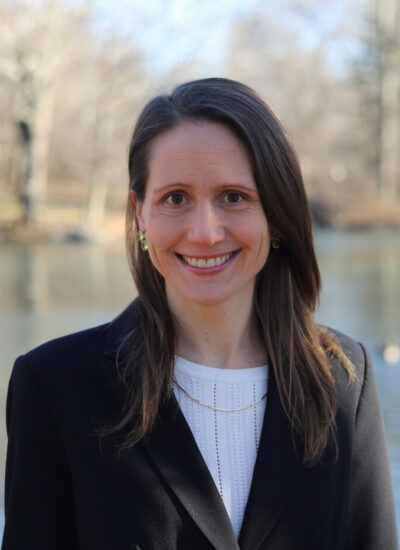
Bethany Davis Noll
Executive Director, State Energy & Environmental Impact Center
Bethany Davis Noll is an expert in administrative and environmental law and an experienced litigator. She is also an adjunct professor at NYU Law and co-chair of the Environmental Law Committee of the New York City Bar Association. Prior to joining the Center, she was Litigation Director at the Institute for Policy Integrity, where she wrote articles, led amicus briefing in cases challenging the Trump administration’s rollbacks of environmental and other rules, and ran Policy Integrity’s “Roundup: Trump-Era Agency Policy in the Courts.” She previously served as Assistant Solicitor General in the New York State Attorney General’s Office, where she filed briefs in major environmental cases in the Supreme Court and earned the Louis J. Lefkowitz Memorial Award for her work. Bethany was also an associate at Debevoise & Plimpton LLP and served as a clerk for the Honorable Chester J. Straub in the Second Circuit Court of Appeals and for the Honorable Shira A. Scheindlin in the District Court for the Southern District of New York. Bethany received a J.D. with distinction from Stanford Law School and a B.A., magna cum laude, from Barnard College.
Introduction

David Katz
Partner, Corporate
David A. Katz is a partner at Wachtell, Lipton, Rosen & Katz in New York City, an adjunct professor at New York University School of Law, and chair of the Board of Advisors of the NYU Law Institute for Corporate Governance and Finance. Mr. Katz is a corporate attorney frequently counsels boards of directors and board committees on corporate governance matters and crisis management. Mr. Katz is a graduate of Brandeis University and New York University School of Law.
Keynote

AG Phil Weiser
Colorado Attorney General
Attorney General Phil Weiser is serving his second term as the 39th attorney general of the state of Colorado. Since becoming the state’s chief legal officer in 2019, Attorney General Weiser has demonstrated an unwavering commitment to serving the people of Colorado, advancing the rule of law, protecting our democracy, and promoting justice for all. Through engagement and collaborative problem solving, the Colorado Department of Law has achieved significant milestones under Weiser’s leadership.
Before his time as attorney general, Weiser was the dean of the University of Colorado Law School. He also served as a law clerk to U.S. Supreme Court Justices Byron R. White and Ruth Bader Ginsburg, and held senior positions in the U.S. Department of Justice in the Clinton and Obama administrations. Attorney General Weiser graduated from New York University Law School in 1994.
Moderator

Katrina Wyman
Sarah M. Herring Professor of Law; Director, Environmental and Energy LLM Program at NYU School of Law
Katrina Wyman is the Sarah Herring Sorin Professor of Law, and the Director of the Environmental and Energy LLM Program at NYU School of Law. Born and raised in Canada, Wyman has a BA, MA, and LLB from the University of Toronto and an LLM from Yale Law School. Before joining NYU School of Law in 2002, she was a research fellow at the University of Toronto Faculty of Law in 2001-02. Wyman’s research interests fall into three categories: property law, natural resources law and policy, and global attempts to redress historical injustices. She has undertaken case studies of the evolution of emissions trading, and property rights in fisheries and taxi licenses. She also has worked on the Endangered Species Act and the policy and legal responses to the possibility that climate change might prompt large-scale human migration.
CLE Info
This event was approved for 1 New York State CLE credit in the category of Areas of Professional Practice. The credit is both transitional and non-transitional; it is suitable for both experienced and newly admitted attorneys. Please note that CLE credit is only available for those who participated in person on April 20th. Credit is not available for watching the conference recording.
Out-of-state CLE: NYU School of Law is an accredited provider of CLE in New York State. If you are seeking CLE credit for a different state, we recommend you consult with your state’s CLE Board to obtain information on reciprocity.
Reading Materials
- Letter to Congress on Fund Managers’ Use of ESG Factors Sent by a Coalition of AGs Led by Minnesota, December 14, 2023
- Testimony of Minnesota Attorney General Keith Ellison before House Financial Services Committee, July 12, 2023
- Letter to Asset Manager Sent by a Coalition of AGs Led by Montana, Louisiana, and Utah, March 30, 2023
- Letter to Congress on Fund Managers’ Use of ESG Factors Sent by a Coalition of AGs Led by the District of Columbia, November 21, 2022
- ESG Considerations and Antitrust: Why ESG-Focused Efforts Have Little to Fear from Antitrust Law, Hill Wellford, Ryan Will, and Laura Muse, Vinson & Elkins LLP, from a Panel on “Making Antitrust Sustainable at ABA Antitrust Section Spring Meeting 2022
- Antitrust and Sustainability: A Landscape Analysis, by Denise Hearn, Cynthia Hanawalt, and Lisa Sachs, Columbia Center on Sustainable Investment and the Sabin Center for Climate Change Law, July 2023

